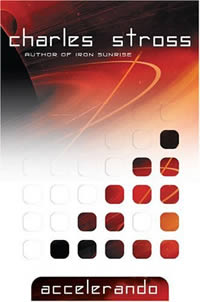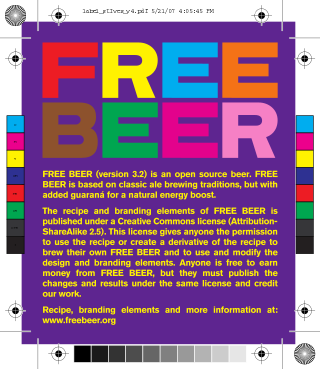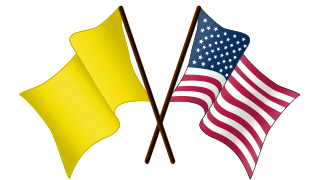
Free software, libre software, libreware or rarely known as freedom-respecting software is computer software distributed under terms that allow users to run the software for any purpose as well as to study, change, and distribute it and any adapted versions. Free software is a matter of liberty, not price; all users are legally free to do what they want with their copies of a free software regardless of how much is paid to obtain the program. Computer programs are deemed "free" if they give end-users ultimate control over the software and, subsequently, over their devices.
The free software movement is a social movement with the goal of obtaining and guaranteeing certain freedoms for software users, namely the freedoms to run, study, modify, and share copies of software. Software which meets these requirements, The Four Essential Freedoms of Free Software, is termed free software.
The hacker ethic is a philosophy and set of moral values within hacker culture. Practitioners believe that sharing information and data with others is an ethical imperative. The hacker ethic is related to the concept of freedom of information, as well as the political theories of anti-authoritarianism, anarchism, and libertarianism.

Intellectual property (IP) is a category of property that includes intangible creations of the human intellect. There are many types of intellectual property, and some countries recognize more than others. The best-known types are patents, copyrights, trademarks, and trade secrets. The modern concept of intellectual property developed in England in the 17th and 18th centuries. The term "intellectual property" began to be used in the 19th century, though it was not until the late 20th century that intellectual property became commonplace in most of the world's legal systems.

Open-source licenses are software licenses that allow content to be used, modified, and shared. They facilitate free and open-source software (FOSS) development. Intellectual property (IP) laws restrict the modification and sharing of creative works. Free and open-source licenses use these existing legal structures for an inverse purpose. They grant the recipient the rights to use the software, examine the source code, modify it, and distribute the modifications. These criteria are outlined in the Open Source Definition.
A cypherpunk is any individual advocating widespread use of strong cryptography and privacy-enhancing technologies as a route to social and political change. Originally communicating through the Cypherpunks electronic mailing list, informal groups aimed to achieve privacy and security through proactive use of cryptography. Cypherpunks have been engaged in an active movement since at least the late 1980s and early 1990s.

Open-source software (OSS) is computer software that is released under a license in which the copyright holder grants users the rights to use, study, change, and distribute the software and its source code to anyone and for any purpose. Open-source software may be developed in a collaborative, public manner. Open-source software is a prominent example of open collaboration, meaning any capable user is able to participate online in development, making the number of possible contributors indefinite. The ability to examine the code facilitates public trust in the software.
Lisp Machines, Inc. was a company formed in 1979 by Richard Greenblatt of MIT's Artificial Intelligence Laboratory to build Lisp machines. It was based in Cambridge, Massachusetts.

Free and open-source software (FOSS) is software that is available under a license that grants the right to use, modify, and distribute the software, modified or not, to everyone free of charge. The public availability of the source code is, therefore, a necessary but not sufficient condition. FOSS is an inclusive umbrella term for free software and open-source software. FOSS is in contrast to proprietary software, where the software is under restrictive copyright or licensing and the source code is hidden from the users.

The adjective free in English is commonly used in one of two meanings: "at no monetary cost" (gratis) or "with little or no restriction" (libre). This ambiguity can cause issues where the distinction is important, as it often is in dealing with laws concerning the use of information, such as copyright and patents.

Accelerando is a 2005 science fiction novel consisting of a series of interconnected short stories written by British author Charles Stross. As well as normal hardback and paperback editions, it was released as a free e-book under the CC BY-NC-ND license. Accelerando won the Locus Award in 2006, and was nominated for several other awards in 2005 and 2006, including the Hugo, Campbell, Clarke, and British Science Fiction Association Awards.

Free Beer is a beer brand collaboration between students of IT University of Copenhagen and the artist collective Superflex initiated in 2004. The recipe of the beer is published under a Creative Commons license, granting others the right to freely use and distribute it.

The free-culture movement is a social movement that promotes the freedom to distribute and modify the creative works of others in the form of free content or open content without compensation to, or the consent of, the work's original creators, by using the Internet and other forms of media.

Richard Matthew Stallman, also known by his initials, rms, is an American free software movement activist and programmer. He campaigns for software to be distributed in such a manner that its users have the freedom to use, study, distribute, and modify that software. Software which ensures these freedoms is termed free software. Stallman launched the GNU Project, founded the Free Software Foundation (FSF) in October 1985, developed the GNU Compiler Collection and GNU Emacs, and wrote all versions of the GNU General Public License.

Copyleft is the legal technique of granting certain freedoms over copies of copyrighted works with the requirement that the same rights be preserved in derivative works. In this sense, freedoms refers to the use of the work for any purpose, and the ability to modify, copy, share, and redistribute the work, with or without a fee. Licenses which implement copyleft can be used to maintain copyright conditions for works ranging from computer software, to documents, art, and scientific discoveries, and similar approaches have even been applied to certain patents.

The GNU General Public Licenses are a series of widely used free software licenses, or copyleft licenses, that guarantee end users the freedoms to run, study, share, and modify the software. The license was the first copyleft for general use and was originally written by Richard Stallman, the founder of the Free Software Foundation (FSF), for the GNU Project. The license grants the recipients of a computer program the rights of the Free Software Definition. The licenses in the GPL series are all copyleft licenses, which means that any derivative work must be distributed under the same or equivalent license terms. It is more restrictive than the Lesser General Public License and even further distinct from the more widely-used permissive software licenses such as BSD, MIT, and Apache.

Cyber Rights: Defending Free Speech in the Digital Age is a non-fiction book about cyberlaw, written by free speech lawyer Mike Godwin. It was first published in 1998 by Times Books. It was republished in 2003 as a revised edition by The MIT Press. Godwin graduated from the University of Texas School of Law in 1990 and was the first staff counsel for the Electronic Frontier Foundation. Written with a first-person perspective, Cyber Rights offers a background in the legal issues and history pertaining to free speech on the Internet. It documents the author's experiences in defending free speech online, and puts forth the thesis that "the remedy for the abuse of free speech is more speech". Godwin emphasizes that decisions made about the expression of ideas on the Internet affect freedom of speech in other media as well, as granted by the First Amendment to the United States Constitution.
A free license or open license is a license that allows copyrighted work to be reused, modified, and redistributed. These uses are normally prohibited by copyright, patent or other Intellectual property (IP) laws. The term broadly covers free content licenses and open-source licenses, also known as free software licenses.

Technolibertarianism, sometimes referred to as cyberlibertarianism, is a political philosophy with roots in the Internet's early hacker cypherpunk culture in Silicon Valley in the early 1990s and in American libertarianism. The philosophy focuses on minimizing government regulation, censorship, or anything else in the way of a "free" World Wide Web. In this case, the word "free" is referring to the meaning of libre, not gratis. Cyber-libertarians embrace fluid, meritocratic hierarchies, which are believed to be best served by markets. The most widely known cyberlibertarian is Julian Assange. The term technolibertarian was popularized in critical discourse by technology writer Paulina Borsook.

Open source is source code that is made freely available for possible modification and redistribution. Products include permission to use the source code, design documents, or content of the product. The open source model is a decentralized software development model that encourages open collaboration. A main principle of open source software development is peer production, with products such as source code, blueprints, and documentation freely available to the public. The open source movement in software began as a response to the limitations of proprietary code. The model is used for projects such as in open source appropriate technology, and open source drug discovery.















